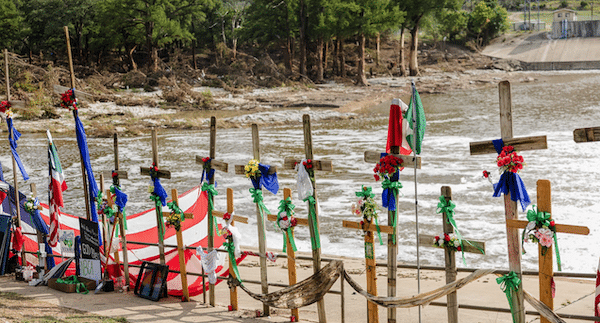Some people might say it’s too soon to blame the management of Camp Mystic in Texas for the deaths of dozens of little girls in their care. It feels wrong to point fingers when the camp’s director, Dick Eastland, died trying to save his charges from the floodwaters that engulfed their cabin. And blame does nothing to relieve the searing agony of those children’s families.
But now we know that the youngest campers at Camp Mystic were housed in bunks in the Guadalupe River’s “floodway”—a strip of shoreline that is virtually guaranteed to flood. Other cabins were built in “flood zones,” an only slightly less dangerous location.
That was always a terrible idea. In the era of climate change—which brings stronger, wetter storms and more flooding—it borders on criminal negligence.
But the negligence can’t be laid at the feet of Camp Mystic alone. The camp is situated in a county, state, and nation that have cemented climate change denial into policy and practice. The result is a death toll that continues to climb as the planet warms—the ten hottest years on record have all occurred during the past decade.
Kerr County, Texas, which is home to Camp Mystic, officially limits construction in floodways. But when Camp Mystic embarked on a $5 million expansion and overhaul six years ago, the county signed off on a plan to build more cabins in the flood zone, while the floodway cabins remained in use.
Kerr County lies deep in the heart of Texas, a state beholden to the oil and gas industry. This is a state whose governor refuses to acknowledge that human activity—notably, the burning of fossil fuels—has anything to do with the changing climate. A state that refuses to do business with firms that divest from oil and gas. A state that has made it illegal for local governments to protect outdoor workers from increasingly extreme heat by requiring shade and water breaks.
Last year, Americans elected a President who has called climate change a “hoax.” During the campaign, Donald Trump promised fossil fuel executives that he would roll back former President Joe Biden’s landmark climate policies in exchange for a $1 billion contribution. He is now making good on that promise by blocking funds to address climate change, gutting environmental agencies, and scrapping cleaner, cheaper renewable energy in favor of “drill, baby, drill” fossil fuel dependence.
Trump is also coming after programs that help Americans deal with ever-more-frequent climate disasters. For example, he has called for the elimination of the Federal Emergency Management Agency “as it exists today,” and cancelled a $4.5 billion program that helps protect hard-hit communities from flooding. Trump has even cut funding for satellite storm surveillance, making it harder to predict when deadly weather is coming.
Cuts to climate science and disaster preparedness mean we are essentially flying blind in a hotter, more dangerous world. Under the reign of Trump’s former best buddy, Elon Musk, the so-called Department of Government Efficiency (DOGE) gutted federal agencies charged with studying climate change and predicting the weather—actions that may well have contributed to the tragedy that unfurled in Texas. In the National Weather Service office that serves Kerr County, a seasoned “warning coordination meteorologist” left his post in April, taking the early retirement package offered by DOGE that was designed to cull the federal workforce. His position was left unfilled.
Which brings us back to Camp Mystic. Before the flood, the camp’s owners successfully appealed to remove the “flood zone” designation from parts of the camp—a move that allowed them to proceed with construction and avoid taking out costly flood insurance. Details are still emerging, but it is possible that Eastman did not fully understand the growing threat—living as he did in a county, state, and nation that has doubled down on climate denial.
The perpetrators of that denial—the fossil fuel executives who lied about climate change and the corrupt public officials who took their money—are guilty of criminal negligence. They are the ones who must answer for the lives of those little girls, and for so many others swept away in deadly floods—now and, sadly, in the floods to come.
This column was produced for Progressive Perspectives, a project of The Progressive magazine, and distributed by Tribune News Service.
Laurie Mazur is an editor at Island Press, and the author, most recently, of Realizing Resilience: Toward a Fairer, Greener Future.

